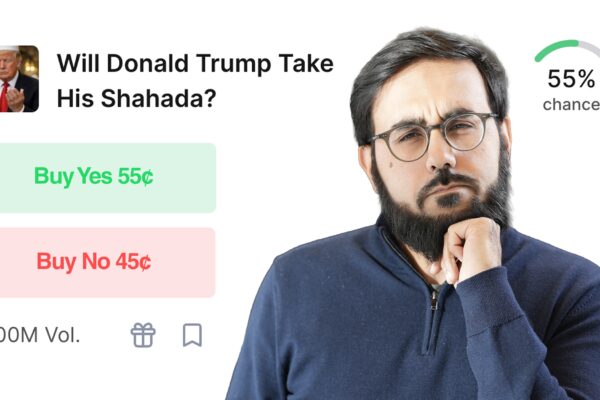
Are Prediction Markets Halal or Haram? The Truth About Polymarket & Kalshi
06 February 2026 7 min read

IW
IFG Staff Writers
7 min read
Last updated on:
For too long, the Muslim community has had little choice when it comes to banking solutions that align with our values. Enter Islamic digital banks, a new type of Islamic finance product.
Advocates argue that these challengers have come in to disrupt the status quo and give Muslims a compelling alternative.
But critics say these banks are solving a problem that doesn’t exist and may run into problems of scaling given the relatively small size of the European Muslim population.
In this article we will break down what an Islamic digital bank is, review each of the contenders and discuss how they fare against the competition.
An Islamic digital bank is a digital bank that doesn’t engage in any impermissible activities that regular banks engage in. For example, dealing with interest or investing their funds in impermissible areas such as gambling.
However it is important to note that not all digital banks (Islamic or otherwise) are actually technically “banks”.
To be a bank and be able to refer to yourself as such, you need a banking license. This allows you to take deposits and issue credit. When you are officially a bank you can offer things like:
You can do this as you are allowed to lend out the deposits that you hold in the form of loans. Neobanks on the other hand, cannot do this themselves.
However many so-called digital banks don’t have banking licenses and instead function as e-money institutions and label themselves as fintechs.
Despite this they are still usually referred to as digital banks in the media. These e-money institutions have the ability to issue e-money and a pre-paid card.
With a pre-paid card, you can only spend money you have pre-loaded and won’t earn interest. You may also be unable to set direct debits and there could be a fee for depositing cash and also withdrawing from ATMs.
This will depend on the provider, so be sure to check. The good news is unlike debit and credit cards, you don’t need to pass a credit check to get one1.
Having a full banking license also gives you access to the Financial Services Compensation Scheme (FSCS) that protects up to £85k of your deposits. E-money institutions are still seen as secure as they are required to hold your money in separate accounts which they aren’t otherwise allowed to access.
Not all Islamic digital banks are trying to become fully-fledged banks. Some are content with just being an e-money institution. It all depends on what their objectives are and what stage of their development they are in.
Monzo, a popular UK digital bank initially started as an e-money institute and obtained the full banking license two years after their inception. Other e-money institutes have partnered with banks to offer the services that they are unable to provide. In summary, digital banks can take many forms.
Digital banks are known for the array of features they offer. They typically include a combination of the below:
Here’s a table that provides a high level summary, then we’ll dive into the details:
|
Contender |
Type |
Live? |
|
Niyah |
EMI |
No |
|
Kestrl |
EMI |
Yes |
|
MyAhmed |
EMI |
Yes |
|
Rizq |
EMI |
Yes |
|
Nomo |
Bank |
Yes |
|
Algbra |
EMI |
No |
|
Moneemint |
Bank |
No |
|
getInsha |
EMI |
Yes |
|
Mizen |
EMI |
No |
Bank or e-money institute?: EMI
Their ethos: To bank without compromise.
Are they live?: Still in development.
Their offerings: They are developing a digital bank account and an accompanying pre-paid card.
Roadmap: Their roadmap includes access to investments, and a feature to calculate and directly pay your Zakat.
Notable partners: Owned by Islamic robo-advisor Wahed Invest. Their infrastructure is being facilitated through Railsbank (a banking-as-a-service platform).
Team: Wahed leaders and co-founders Ali Abdulkadir Ali, Yakub Elmi and Safdar Alam who have a good mixture of computational, entrepreneurial and Islamic finance experience.
Amount raised: Their parent company Wahed has raised over $40m2.
Regulation status: Currently the agent of an EMI. This means they are not directly authorised themselves yet, and operate under the licence of another entity.
Locations covered: Will launch in the UK with plans to expand into North America, Asia, Europe and the Middle East.
User experience: N/A.
The IFG view: Being owned by Wahed which already has an established global presence could be a strong competitive advantage for Niyah. We would expect Wahed to roll up the banking and investment into one app in due course.
Bank or e-money institute?: EMI
Their ethos: Helping customers to achieve their financial goals without compromise.
Are they live?: Yes.
Their offerings: Manage your finances by connecting all of your bank accounts in one place and using their budgeting tool. They have a marketplace of various halal investment products that you can access through them as well as a Zakat payment tool.
Roadmap: A debit card and a savings account allowing you to earn a halal return on your money. Other interesting products in the pipeline include a carbon calculator allowing you to assess the footprint of your spending, a halal stock screening tool and a savings finder helping you to find the cheapest energy and broadband deals.
Notable partners: Kestrl have said that they are looking to work with some of the UK’s Islamic banks to become a digital front end for their savings accounts3.
Team: Areeb Siddiqui, Daeng Termizi and are working with data scientists and have a tech team in Malaysia. Their board includes former CEOs of Al Rayan and HSBC Amanah bringing a wealth of Islamic finance experience to the table.
Amount raised: £325k4.
Regulation status: Currently the agent of an EMI. This means they are not directly authorised themselves yet, and operate under the licence of another entity.
Locations covered: They have launched in the UK and have plans to expand into Southeast Asia.
User experience: Signing up and using their app is quick and easy. The user interface is pretty neat as well.
The IFG view: Kestrl have done well to get an app out that already has users. Time will tell if budgeting and saving are a key pain point for Muslim consumers. If they can add on a robust B2B tech licencing business that could be really promising and a way to distinguish them from others in the market.
Bank or e-money institute?: EMI
Their ethos: Changing the way Muslims manage money.
Are they live?: Yes.
Their offerings: A digital bank account with a Visa pre-paid card that allows you to set up standing orders and make direct debit payments. They have a savings pot that you can save into individually or as part of a group.
Also worth mentioning that MyAhmed has founded Khadija Teaches Money, a charity that seeks to champion financial inclusion and literacy through education.
Roadmap: Their roadmap includes access to interest-free credit and a Euro account for residents of the European Economic Area (EEA).
Notable partners: N/A
Team: Founders Jad Salha and Kareem Ghazal have decades of experience in financial services.
Amount raised: Unknown. Estimated £500k
Regulation status: Currently the agent of an EMI. This means they are not directly authorised themselves yet, and operate under the licence of another entity.
Locations covered: UK and Europe.
User experience: Sign up was quick and easy and the user interface looks sleek.
The IFG view: We like the user interface and user experience of their app. They may need to widen their offering though to compete with some of the players who provide more features.
Bank or e-money institute?: EMI
Their ethos: Interest-free powerful banking with your beliefs and values in mind.
Are they live?: Yes.
Their offerings: A digital bank account with an accompanying pre-paid card. They also enable you to send money abroad cheaply and you can earn cashback when shopping with their retail partners.

06 February 2026 7 min read

03 December 2025 8 min read

26 November 2025 6 min read
Leave a Reply